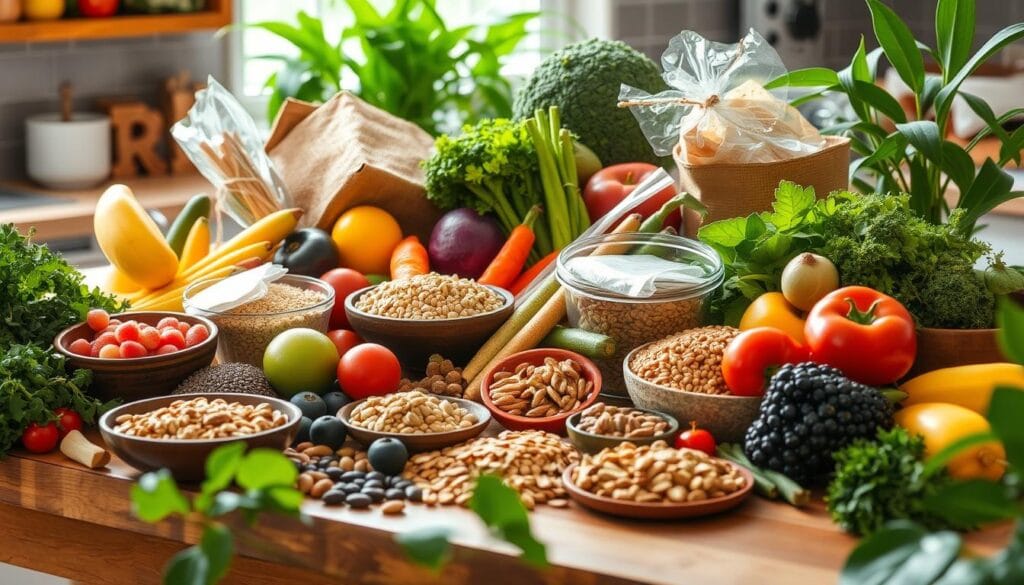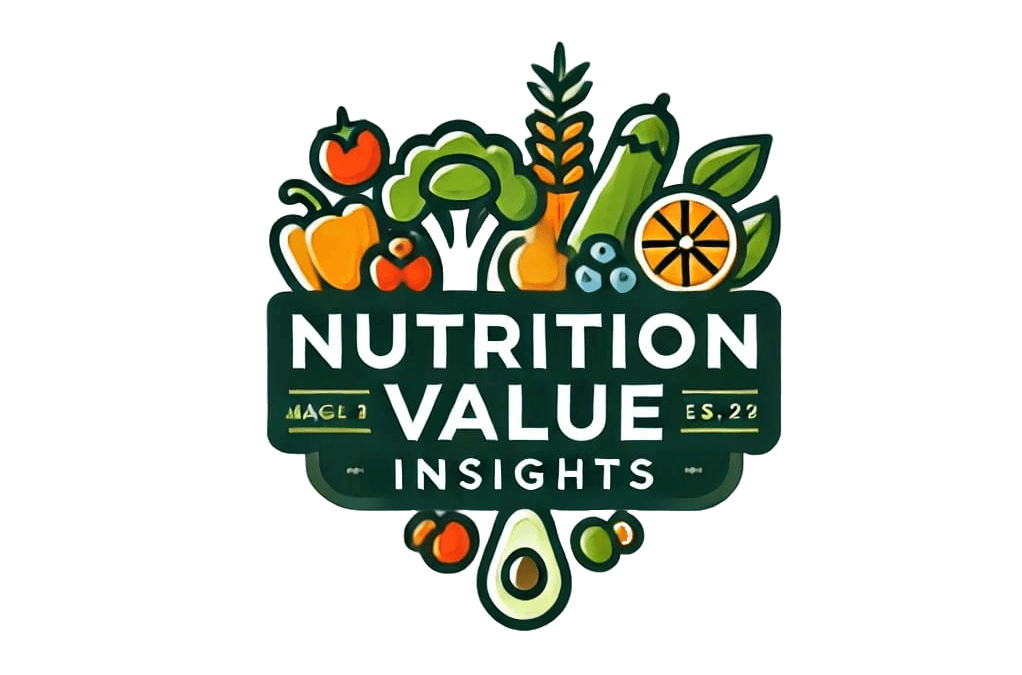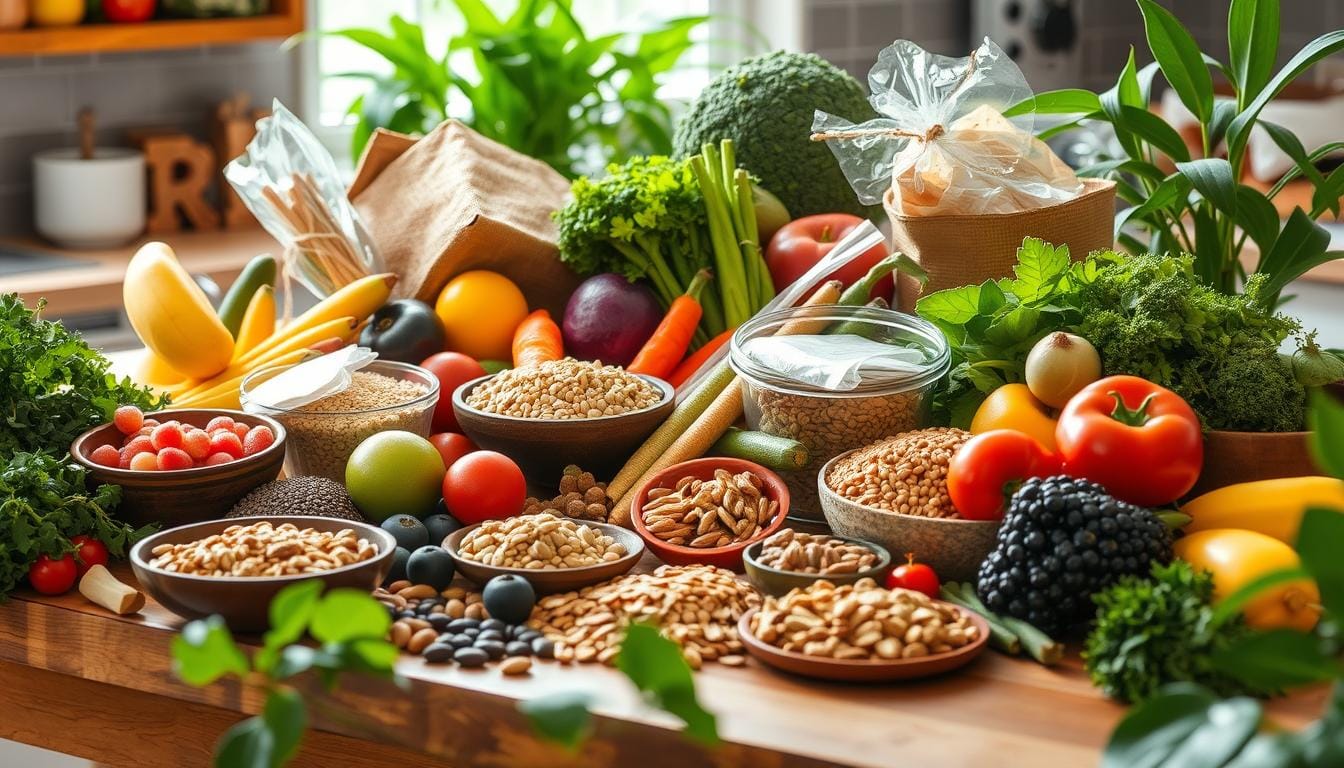Understanding the Value of Whole Foods vs Processed Foods
The debate between whole foods and processed foods is growing in the world of nutrition. It’s important to know the differences between them and how they affect your health. This article will dive into the details of whole foods and processed foods, highlighting their nutritional values and health impacts.

Whole foods, also called “natural” or “unprocessed” foods, are foods that haven’t been changed much. They include fruits, vegetables, whole grains, and lean proteins. These foods are full of nutrients and help keep your body healthy.
On the other hand, processed foods have been changed a lot. They often have preservatives, artificial flavors, and other synthetic ingredients. While they might be easy to find and last longer, they can also harm your health.
Table of Contents
Exploring the Debate: Whole Foods vs Processed Foods
The debate between whole foods and processed foods is a big topic. Nutritionists, health experts, and the food industry all have strong opinions. Knowing the details of this debate helps us make better food choices.
Whole food supporters say eating natural foods is best. They believe these foods are full of nutrients and have fewer additives. They think the processed food industry cares more about money than our health.
The processed food industry has its own side of the story. They say their foods are easy to find, affordable, and meet nutritional needs. They claim that food processing makes food safer and lasts longer, which is good for us.
Let’s look closer at what whole foods and processed foods are. We’ll see how their nutritional values and health effects differ.
“The path to a healthier life often starts with the food we choose to nourish our bodies. Understanding the nuances of the whole foods vs. processed foods debate can empower us to make more informed decisions about our diets.”
Defining Whole Foods and Processed Foods
Knowing the difference between whole foods and processed foods is key to good eating habits. Food processing varies from simple to very complex, affecting our health differently.
What Are Whole Foods?
Whole foods are natural and not heavily changed. They keep their nutrients and health benefits. Examples include fruits, vegetables, whole grains, legumes, nuts, seeds, and lean meats. These foods are full of vitamins, minerals, fiber, and antioxidants, helping us stay healthy.
What Are Processed Foods?
Processed foods are foods that have been changed from their natural form. This can be from simple changes, like bagged salads or frozen veggies, to complex changes with lots of added stuff. These foods often don’t have the nutrients of their whole food versions.
| Whole Foods | Processed Foods |
|---|---|
| Natural, unrefined, minimally processed | Altered from their natural state, may contain artificial additives and preservatives |
| Nutrient-dense, high in essential vitamins, minerals, fiber, and antioxidants | May lack essential nutrients found in whole foods |
| Examples: fruits, vegetables, whole grains, legumes, nuts, seeds, lean meats | Examples: bagged salads, frozen vegetables, highly processed snacks, and pre-made meals |

Understanding whole foods and processed foods helps you choose better. Focus on natural, nutrient-rich foods for a healthier diet.
Nutritional Comparison: Whole Foods vs Processed Foods
Choosing between whole foods and processed foods is key for good nutrition. Whole foods like fruits, veggies, grains, and proteins are full of nutrients. Processed foods, however, often have additives and preservatives that can harm their nutritional value.
Nutrient Density in Whole Foods
Whole foods are rich in essential vitamins, minerals, and plant compounds. These nutrient-dense foods help your body function well. But, many processed foods lose their natural nutrients during making, making them less healthy.
| Nutrient | Whole Foods | Processed Foods |
|---|---|---|
| Vitamin A | High in carrots, sweet potatoes, and leafy greens | Often lost during processing, may be added back in artificially |
| Vitamin C | Abundant in citrus fruits, bell peppers, and broccoli | Highly susceptible to degradation during processing and storage |
| Fiber | Whole grains, fruits, and vegetables are excellent sources | Removed or reduced in many processed food items |
Additives and Preservatives in Processed Foods
Processed foods often have artificial additives and preservatives to improve taste, texture, and shelf life. While they may work well, they can also harm your health. Common additives include artificial colors, flavors, and sweeteners, plus preservatives like sodium nitrite and BHA.
“Processed foods can be high in sodium, added sugars, and unhealthy fats, which may increase the risk of chronic diseases like heart disease, type 2 diabetes, and certain types of cancer.”
Knowing the nutritional differences between whole and processed foods helps you make better choices. These choices support your health and well-being.
Whole Foods vs Processed Foods: Health Benefits and Risks
Choosing between whole foods and processed foods greatly affects your health. Knowing the benefits of whole foods and the risks of processed foods helps you make better food choices.
Whole foods, like fruits, veggies, and grains, are packed with nutrients. They support your body and help prevent chronic diseases. On the other hand, processed foods often lack these nutrients due to their manufacturing process.
Processed foods also pose health risks. They contain additives and unhealthy fats, which can lead to weight gain and chronic diseases. Even cancer risk can increase.
“Eating a diet rich in whole foods can have a profound impact on your overall health, reducing your risk of chronic conditions and supporting optimal weight management.”
Whole foods, however, offer many benefits. They help with weight management, digestion, and lower disease risk. Switching to whole foods can lead to a healthier life.

The choice between whole and processed foods is key to your health. By choosing whole foods, you can improve your health, reduce disease risk, and live a more nourishing life.
Whole Food Diet: Embracing a Nutritious Lifestyle
Starting a whole food diet is a big step towards better health. It focuses on foods that are not processed much and are full of nutrients. This way, you feed your body well and live a balanced life. We’ll share tips to make whole foods a part of your daily life.
Tips for Incorporating More Whole Foods
Starting a whole food diet is easy. Begin by swapping processed foods for whole foods. Choose fresh fruits, veggies, whole grains, lean proteins, and healthy fats. Try new recipes with lots of whole ingredients.
- Shop the store’s edges for fresh whole foods.
- Check labels for simple, recognizable ingredients.
- Try new foods like quinoa, lentils, or avocado in your meals.
- Have whole food snacks like nuts, apples, or carrot sticks ready.
Meal Planning and Preparation Strategies
Good meal planning and prep are key to a healthy lifestyle. Plan your meals and cook whole food dishes ahead of time. This way, you always have healthy food ready.
- Plan your meals and make a grocery list each week.
- Make big batches of meals like soups or roasted veggies for the week.
- Get kitchen tools like blenders or slow cookers to make prep easier.
- Find recipes that use lots of whole ingredients and different cooking ways.
Choosing a whole food diet and lifestyle is great for your health. You’ll get important nutrients and feel better overall. Start this journey with curiosity and commitment. See how whole foods can change your life.
The Impact of Processed Foods on Your Body
Eating processed foods can affect your body in both short and long terms. It’s important to know these effects to make better food choices.
Short-Term Effects of Processed Food Consumption
Processed foods can cause quick changes in your body. You might see spikes in blood sugar, feel tired, or have stomach problems like bloating. These foods often have too much sugar, unhealthy fats, and artificial stuff. This can upset your body and cause discomfort.
Long-Term Consequences of a Processed Food Diet
Eating too much processed food can lead to serious health issues over time. It can increase your risk of obesity, diabetes, heart disease, and some cancers. Processed foods lack important nutrients but have harmful additives. This can weaken your immune system and cause chronic inflammation.
FAQ
What are the key differences between whole foods and processed foods?
Whole foods are not heavily processed. They keep their natural nutrients and fibre. Processed foods, on the other hand, lose nutrients and gain additives and preservatives.
What are the health benefits of incorporating more whole foods into my diet?
Whole foods are full of vitamins, minerals, and fibre. They help keep you healthy and can lower disease risks. Eating whole foods can also help with weight and improve heart health.
What are the potential health risks associated with a diet high in processed foods?
Eating too much processed food can lead to obesity and diabetes. It also raises the risk of heart disease and some cancers. This is due to added sugars, unhealthy fats, and sodium in these foods.
How can I incorporate more whole foods into my diet?
To eat more whole foods, focus on fresh fruits and veggies. Choose whole grains and lean proteins like poultry and fish. Try to avoid processed snacks. Cooking at home and meal planning can also help.
What are the short-term and long-term effects of a diet high in processed foods?
Eating a lot of processed foods can make you feel tired and bloated. Over time, it can lead to serious health problems like obesity and heart disease. The lack of nutrients in these foods harms your health.
DID OUR INFORMATION HELP YOU ?
There are no reviews yet. Be the first one to write one.

